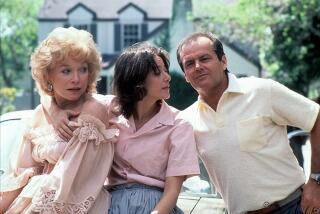From the Archives: Sir John Mills, 97; Acclaimed British Actor Best Known for Wartime Roles
Sir John Mills, the Academy Award-winning actor and patriarch of one of Britain’s leading theatrical families, died Saturday. He was 97.
Mills, the father of actresses Hayley and Juliet Mills, died at his home in Denham, west of London, after a short illness.
Knighted by Queen Elizabeth II in 1976, Mills was a onetime West End musical comedy song and dance man whose versatile career spanned more than 70 years and more than 100 movies.
Mills won an Oscar and a Golden Globe as best supporting actor for his role as the brain-damaged mute villager in “Ryan’s Daughter,” David Lean’s 1970 romantic drama set in Ireland during World War I.
On film, Mills was best known for portraying rather ordinary men who display, as one observer once put it, “the qualities of English decency operating at every level of society.”
After making his film debut as a sailor in the 1932 comedy “The Midshipmaid,” Mills went on to play Robert Donat’s student Peter Colley as a young man going off to war in “Goodbye, Mr. Chips” (1939) and to co-star with Noel Coward in Coward and Lean’s acclaimed World War II drama “In Which We Serve” (1942).
Mills’ career encompassed numerous classic British films, including Lean’s 1946 adaptation of Dickens’ “Great Expectations,” in which Mills played Pip as a young man; and Bryan Forbes’ 1966 comedy “The Wrong Box,” set in Victorian England.
Often cast in war dramas, Mills starred in films such as “Waterloo Road,” “Ice-Cold in Alex,” “Dunkirk,” “The Colditz Story” and “I Was Monty’s Double” — as well as starring in “Scott of the Antarctic,” “Hobson’s Choice” and “Swiss Family Robinson.” He also frequently turned up in supporting roles and smaller roles in films such as “King Rat,” “Oh! What a Lovely War” and “Gandhi.”
Co-starring with Sir Alec Guinness in the 1960 military drama “Tunes of Glory,” Mills gave one of his greatest film performances — and earned a Venice Film Festival award for best actor — playing a neurotic, nerve-racked British martinet determined to restore order to his regiment.
He played even further against type in the mute villager role that earned him an Academy Award.
“It was weird,” Mills told Associated Press in 1988. “I just thought I’d been wasting my time for the past 55 years learning all these millions of lines, and then getting an Oscar for not speaking.”
In “John Mills: 80 Years On,” a TV program aired by the British Broadcasting Corp. in 1988, Sir Richard Attenborough said Mills “gave film acting in England an integrity and a stature that nobody else did precisely in that way.” Mills, Attenborough said, possessed “the image and the charisma of a major movie star who is essentially an indigenous movie star.... He belongs to his own country and epitomizes his own country.”
Mills, who also produced and directed a number of films, appeared in more than 40 London stage productions, including “Charley’s Aunt,” “A Midsummer Night’s Dream,” “Of Mice and Men” and “Separate Tables.”
He made his Broadway debut in 1961 — and earned a Tony Award nomination — playing the title role of “Ross,” Terrence Rattigan’s play based on the life of T.E. Lawrence.
He also co-starred with Sean Garrison in “Dundee and the Culhane,” a short-lived 1967 western TV series.
Mills was married 64 years to novelist and playwright Mary Hayley Bell, whose novel “Whistle Down the Wind” became a 1961 film starring daughter Hayley.
Roles in Daughters’ Films
John Mills worked professionally with both of his daughters, appearing in five films with Hayley, including “Tiger Bay,” her 1959 film debut. Daughter Juliet appeared in a number of films with her father, who also made a guest appearance on her 1970s sitcom “Nanny and the Professor.” John and Mary Mills’ son Jonathan is a writer and has made surfing videos. And Hayley’s son, Crispian Mills, is the former lead singer of Kula Shaker, a top United Kingdom pop band.
“He is a very instinctive actor, and there is a great truth in his work,” Hayley Mills said of her father in a 2002 interview with Australia’s Daily Telegraph. “He has that ring of truth about him and a very emotional center to his being.”
Born Lewis Ernest Watts Mills in Norfolk on Feb. 22, 1908, Mills was the son of the headmaster of a village school near Great Yarmouth in Suffolk, where Mills spent part of his early years.
“One of the luckiest things that ever happened to me was to be born with a desperate desire to become an actor. I never remember at any age wanting to be anything else,” Mills wrote in “Up in the Clouds, Gentlemen Please,” his 1980 memoir.
In his late teens, he worked as a clerk in a corn merchant’s office while acting in amateur dramatic societies. Encouraged by his older sister, Annette, a professional dancer, he moved to London to pursue his dream of becoming an actor.
To support himself until he could get a job on the London stage, Mills worked as a traveling salesman selling toilet paper and other products — a job at which, he later said, he was “a total failure.”
He devoted his evenings to tap-dancing lessons and made his stage debut as a chorus boy in “The Five O’clock Girl” at the London Hippodrome in 1929. Later that year, he joined “The Quaints,” an acting troupe that toured India and the Far East with a repertory of modern plays, musical comedies and Shakespeare.
While in Singapore, Mills received a big break: Noel Coward, the legendary playwright, actor and songwriter, saw Mills perform in a musical comedy and came backstage to compliment him. Coward later employed Mills to fill in for an ailing actor in another show. He also told Mills to look him up when Mills returned to London.
Back in England, Mills did a comic turn in “Charley’s Aunt,” then appeared in “Charles B. Cochran’s 1931 Revue” (for which Coward wrote material). He followed that with a role in the hit Coward play “Cavalcade” and appeared in Coward’s “Words and Music,” a 1932 revue. By then, Mills had married his first wife, actress Aileen Raymond, whom he divorced in 1940.
A Boost From Olivier
After launching his film career in 1932, Mills appeared in numerous British films between stage assignments. But after seven years primarily as a musical comedy juvenile lead, he recalled in a 1991 interview with the Melbourne Herald Sun, “I decided I’d got really as far as I was going to get.”
Instead, he said, “I decided I was going to try and get into the legitimate theater. I was having dinner with Larry Olivier and Vivien Leigh one night and telling Larry I was pretty desperate.” That same night, director Tyrone Guthrie, who was about to start a season at the legendary Old Vic Theatre, stopped by for a drink and mentioned that he was having a problem casting Puck in “A Midsummer Night’s Dream.”
“Well, you needn’t look any further,” Olivier said, pointing to Mills. “The actor you want is sitting right there.”
In 1939, after appearing as Puck in “A Midsummer Night’s Dream” and as Young Marlowe in “She Stoops to Conquer” at the Old Vic, Mills turned in a breakthrough, award-winning performance as George in a hit West End production of John Steinbeck’s “Of Mice and Men.”
To prepare for the part, Mills watched James Cagney in “Angels With Dirty Faces” at least a dozen times.
“I had never played an American, I needed the accent, and incidentally a lot of Jimmy Cagney himself,” he wrote in his memoir. “He would have been terrific as George and I built the character with that wonderful little American actor in mind.”
In 1940, Mills enlisted in the Royal Engineers but received a medical discharge after a year and a half due to a duodenal ulcer.
While on a 48-hour pass in 1941, he married Mary Hayley Bell. “I had never met anyone so natural, unaffected and totally entrancing in my whole life,” he said of her in his memoir. She gave up her own acting career after their marriage and began writing plays for her husband, including “Men in Shadow,” “Duet for Two Hands” and “The Uninvited Guest.”
In 1948, a time in which he later said he was “just a jobbing actor,” Mills won the London Daily Mail’s National Film Award as the nation’s most popular actor, as determined by a poll of readers.
Ten years later, director J. Lee Thompson visited the veteran actor to discuss Mills’ role as the detective in the upcoming crime-thriller “Tiger Bay.” During his visit, Thompson was so charmed by 12-year-old Hayley that he cast her in a key role that originally had been written for a boy.
“The picture got great notices, but Hayley’s were nothing short of sensational,” Mills wrote in his memoir.
His children were important to Mills, as was his long marriage to Mary of whom he said a few years ago, “I’m lost without her.”
On their 60th wedding anniversary in 2001, the couple renewed their marriage vows in a ceremony in the village church near their 17th century Buckinghamshire estate in Denham.
“It was the happiest day of my life, and my life has been full of happy days.”
Mills is survived by his wife, their children and grandchildren.
Services are being planned for Wednesday in Denham, England.
From the Archives: Don Ameche, Dapper Film Star, Dies at 85
From the Archives: Rosa Parks, dies at 92; civil rights icon set wheels of justice in motion
From the Archives: Actor David Niven’s Dashing Life Ends at 73
From the Archives: Armand Hammer Dies; Billionaire, Art Patron
From the Archives: Suave Film Star Clifton Webb Dies at 76
More to Read
Start your day right
Sign up for Essential California for the L.A. Times biggest news, features and recommendations in your inbox six days a week.
You may occasionally receive promotional content from the Los Angeles Times.






